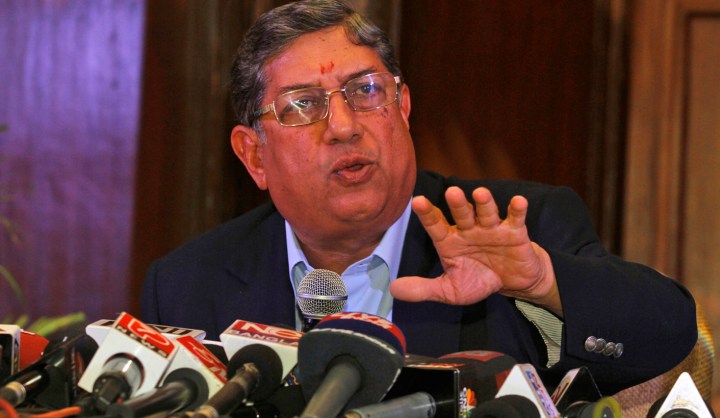Sport
ICC’s lack of leadership continues to hamper progress

Cricket currently sits in a state of flux, and based on the decisions over the last week, it looks like that flux will very soon deteriorate into disarray. The lack of leadership from the custodians of the game continuous to poison progress. By ANTOINETTE MULLER.
You don’t need to be an ardent observer of cricket’s governing structures to understand that the game is in flux. Following a change in how decisions are made, with the English, Australian and Indian Cricket Boards bagging the biggest share of the pie, it is vitally important for the men at the helm to keep doing what is best for the game.
It can be through simple decisions or more complicated ones, but the International Cricket Council (ICC) is still failing.
Last week, the representatives of all the full-member boards and the crumbs of the others met to discuss a number of issues. Barring the misrepresentation of the associates – with just three members present to make decisions for 37 countries – there was also a sour undertone in the presence of one N. Srinivasan.
Srinivasan stepped down from his duties as BCCI president after the Supreme Court in India recommended he does so while investigations of corruption in the Indian Premier League are on-going.
Those allegations are yet to be proven and Srinivasan is only involved by association. However, a quick glance at the ICC’s code of conduct and ethics makes it clear that he never should have been present.
Clause 2.1 states: Directors shall not engage in any conduct that in any way denigrates the ICC or harms its public image.
Furthermore, clause 4.11 (F) of the ICC’s constitution states that an ICC director can be removed as a member of the Executive Board on any one of the following grounds:
(1) he is guilty of any dishonesty, gross misconduct or wilful neglect of duty (whether by act or omission)
(2) in the reasonable opinion of the Executive Board, he commits (whether by act or omission) any act which brings or would tend to bring the Council into disrepute; or
(3) he conducts himself in a manner materially adverse to the interests of the Council.
Based on the above, there is no way that he should be taking over as chairman during the body’s annual meeting scheduled to take place in July. He might be innocent until proven guilty and could very well come off scot-free, but you’d be hard pressed to argue that his involvement-by-association in the fixing saga is not harming the image of the ICC.
Those who deal with these sorts of things have simply washed their hands of the issue and said that it’s an “internal matter”, but the world’s players’ body, FICA, has strongly objected.
“While we are pleased that Mr Srinivasan, at the behest of the Supreme Court, has agreed to step down from his duties as BCCI President, we are of the firm belief that he should not be exercising any functions on behalf of the ICC either, while any investigations concerning his conduct or that of his company are pending or unresolved,” Paul Marsh, head of the cricketers’ global representative body, has said.
“The cricket world has been told time and again by the ICC that corruption is the game’s biggest issue and that the game has a zero-tolerance approach to it.
“For our game to survive, we need it to be not only free of corruption but free of any suspicion of corruption. The ICC needs to put the reputation of the game and confidence in its procedures first. The players, and other stakeholders in the game, are entitled to expect this from the ICC’s Executive Board.
“Under the current circumstances, the prospect of Mr Srinivasan taking the highest posting in world cricket, while these matters are unresolved, is an impossible one.”
The complete lack of accountability and responsibility form those within the corners of the governing body is shocking. It seems as if they are currently only pandering to every whim of its biggest money spinner. During a time when cricket is in desperate need of guidance, the silence and seeming apathy from its guardians is galling.
Furthermore, the ICC’s continued failure to treat associate countries with respect, while it feeds disastrous full-members, is a nothing short of a shambles. Cricinfo reported on Sunday that Zimbabwe Cricket would be given yet another bailout by the ICC, despite previously mismanaging a loan worth US $6 million.
Zim’s cricket board has not been held accountable for their mismanagement, and spoon feeding an organisation that continuously fails to serve not only its fans but also its players is a slap in the face for the associates who are trying to make the best of their situation. Ireland, for example, have made a serious attempt at setting up an adequate first-class structure in order to begin the charge for Test status. Countries like Ireland and others who hope to set up first-class structures and grow the game could do with a financial boost to help them achieve their ultimate goal: Test status.
Instead, associates have been given a half-baked “pathway to Test cricket” promise. At the aforementioned meeting, the ICC decided on “the introduction of an ICC Test Challenge which will take place every four years between the lowest-ranked Test team and the winner of the ICC Intercontinental Cup.”
The team ranked 10th on the ICC Test rankings will play two five-day matches at home and two five-day matches away against the winner of the upcoming ICC Intercontinental Cup, with the inaugural Challenge scheduled to take place during 2018.
That sounds like progress, but there is much to ponder. As pointed out by Andrew Nixon at Cricket Europe, there has been similar false hope for associate teams in the past.
“Back in 2010, every press release about the World Cricket League said it was part of the qualification pathway to the 2015 World Cup. All of a sudden it stopped appearing in press releases. And then it was taken away as the ICC announced that the 2015 World Cup would be contested by the ten full members only,” Nixon notes.
The decision does not state whether the team that possibly gets promoted will be granted Test status. As per previously releases, they won’t. That’s no good for the associate nations as they will still have limited voting rights and will receive less funding from the ICC while playing Tests. There is no fairness in that approach, especially not while inadequate full-members continue to be nursed.
Cricket is in a state of flux and everyone is eyeing every move of the custodians of the game. Some big decisions have been made and some big results are expected. In its current form, the ICC is severely flawed, but flaws can be fixed through good and fair governance. However, the lack of leadership completely obliterates any prospect of that happening any time soon. DM
Photo: Indian cricket board (BCCI) President N. Srinivasan speaks to the media during a news conference in Kolkata May 26, 2013. REUTERS/Rupak De Chowdhuri



















 Become an Insider
Become an Insider